
LLM-Brained-GUI-Agents-Survey
GitHub page for "Large Language Model-Brained GUI Agents: A Survey"
Stars: 138
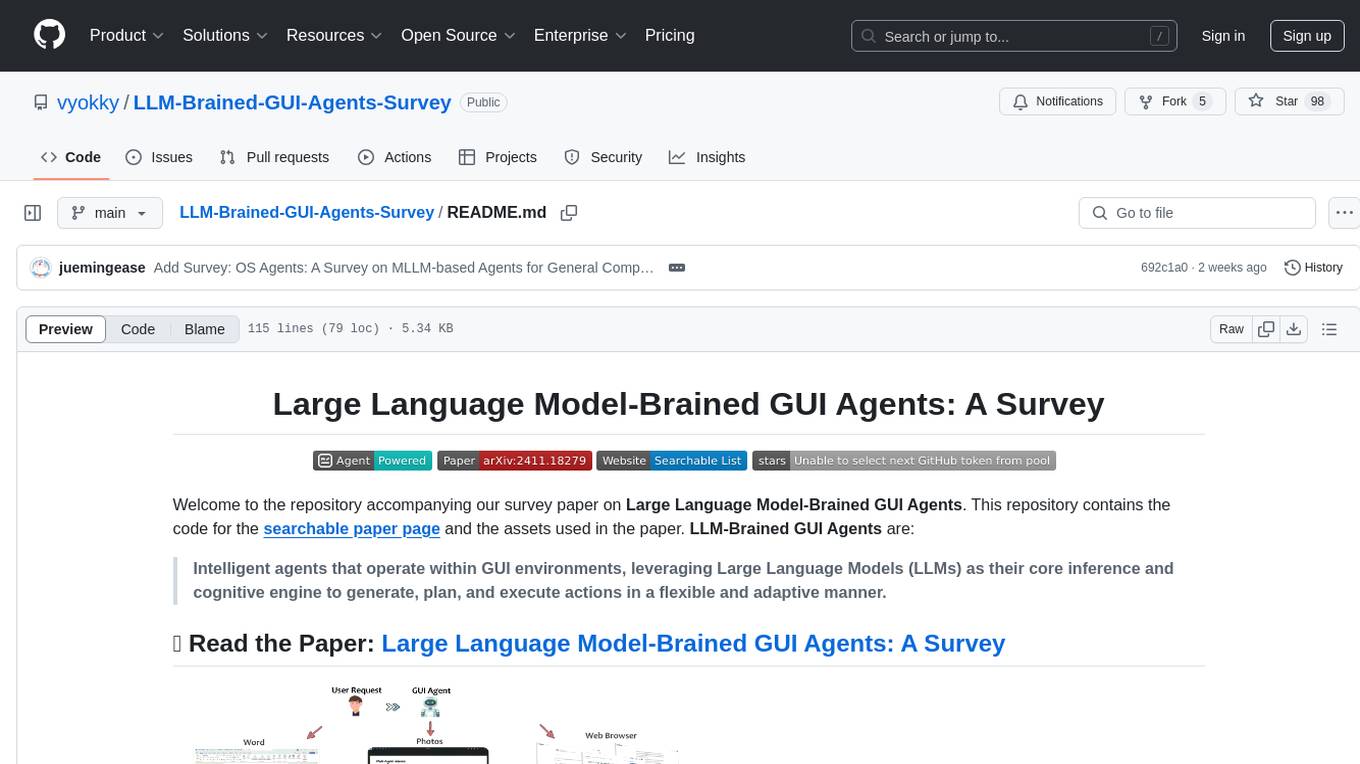
The 'LLM-Brained-GUI-Agents-Survey' repository contains code for a searchable paper page and assets used in the survey paper on Large Language Model-Brained GUI Agents. These agents operate within GUI environments, utilizing Large Language Models as their core inference and cognitive engine to generate, plan, and execute actions flexibly and adaptively. The repository also encourages contributions from the community for new papers, resources, or improvements related to LLM-Powered GUI Agents.
README:
Welcome to the repository accompanying our survey paper on Large Language Model-Brained GUI Agents. This repository contains the code for the searchable paper page and the assets used in the paper. LLM-Brained GUI Agents are:
Intelligent agents that operate within GUI environments, leveraging Large Language Models (LLMs) as their core inference and cognitive engine to generate, plan, and execute actions in a flexible and adaptive manner.
📖 Read the Paper: Large Language Model-Brained GUI Agents: A Survey
If you find our work useful, please consider citing:
@article{zhang2024large,
title={Large Language Model-Brained GUI Agents: A Survey},
author={Zhang, Chaoyun and He, Shilin and Qian, Jiaxu and Li, Bowen and Li, Liqun and Qin, Si and Kang, Yu and Ma, Minghua and Liu, Guyue and Lin, Qingwei and others},
journal={arXiv preprint arXiv:2411.18279},
year={2024}
}🔍 Explore the Searchable Paper Page
The Searchable Paper Page is a web-based interface that allows you to search and filter through the papers in our survey. You can also view the papers by category, platform, and date.
Last updated: March 30th, 2025.
🤝Contributions Welcome!
We encourage the community to contribute to this repository. If you have suggestions for new papers, resources, or improvements, please open an issue or submit a pull request.
To contribute, follow these steps:
Find the *.json file in the data directory which matches the category of the paper you want to add. It should be either survey, framework, dataset, model, benchmark, gui-testing, or visual-assistant.
-
survey: Papers that provide a survey of the LLM-Powered GUI Agents. -
framework: Papers that introduce a new framework or architecture for LLM-Powered GUI Agents. -
dataset: Papers that introduce a new dataset for optimizing models for LLM-Powered GUI Agents. -
model: Papers that introduce a new optimized model for LLM-Powered GUI Agents. -
benchmark: Papers that introduce a new benchmark for evaluating LLM-Powered GUI Agents. -
gui-testing: Papers that uses LLM-powered agents for GUI testing. It is mainly focused on the testing applications aspect. -
visual-assistant: Papers, open-source projects, or products that use LLM-powered agents for visual assistance, such as voice assistants, produtized web agents, etc. It is mainly focused on the applications aspect.
In the corresponding json file, add the paper details in the following format to the existing list of papers:
{
"Name": "Paper Title",
"Platform": "Device or OS Platform, e.g. Mobile, Web, Desktop, Android, Windows, etc.",
"Date": "Month Year",
"Paper_Url": "The paper link of the paper",
"Highlight": "A brief highlight of the paper, up to 2 sentences.",
"Code_Url": "The project or code link of the paper",
}After adding the paper details, submit a pull request with the title Add Paper: Paper Title and we will review it as soon as possible. Once the pull request is merged, the paper will be automatically added to the Searchable Paper Page.
Here are some other repositories that you might find useful:
- GUI-Agents-Paper-List
- Awesome-GUI-Agent
- Awesome-LLM-based-Web-Agent-and-Tools
- awesome-ui-agents
- OS-Agent-Survey
⭐ If you find this repository helpful, please consider to cite our paper and give it a star!
If the authors of the paper wish to have their paper removed from the website, please contact [email protected].
For Tasks:
Click tags to check more tools for each tasksFor Jobs:
Alternative AI tools for LLM-Brained-GUI-Agents-Survey
Similar Open Source Tools

LLM-Brained-GUI-Agents-Survey
The 'LLM-Brained-GUI-Agents-Survey' repository contains code for a searchable paper page and assets used in the survey paper on Large Language Model-Brained GUI Agents. These agents operate within GUI environments, utilizing Large Language Models as their core inference and cognitive engine to generate, plan, and execute actions flexibly and adaptively. The repository also encourages contributions from the community for new papers, resources, or improvements related to LLM-Powered GUI Agents.
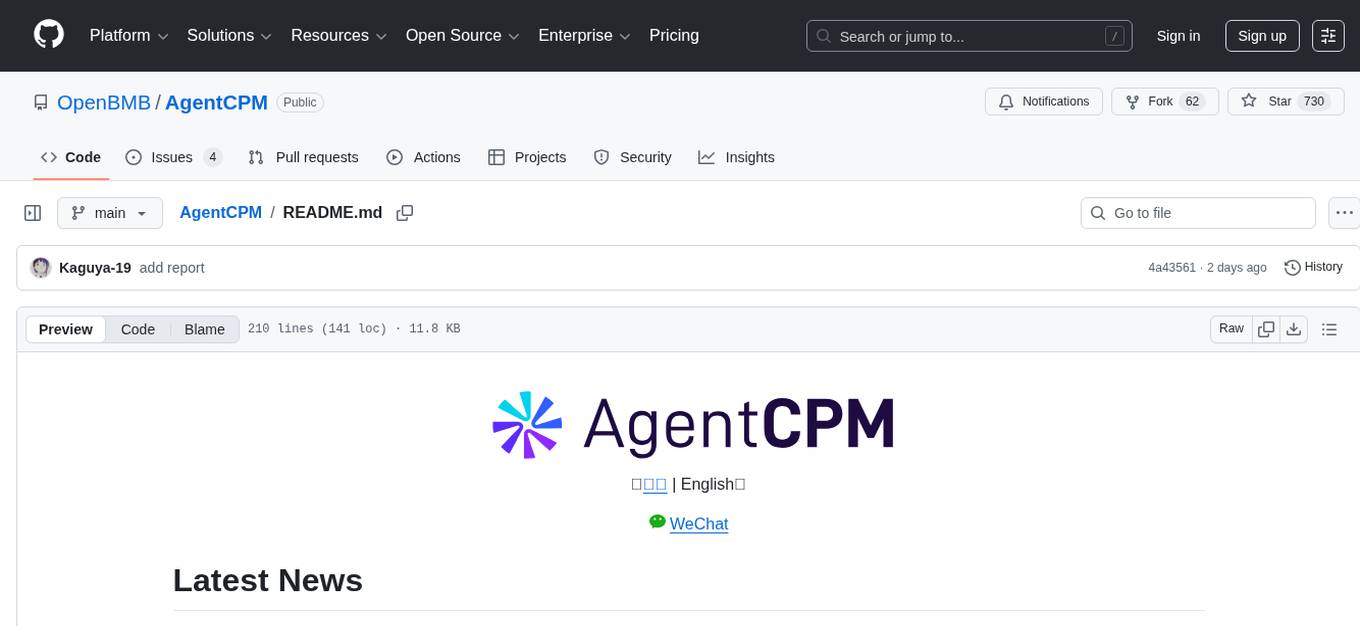
AgentCPM
AgentCPM is a series of open-source LLM agents jointly developed by THUNLP, Renmin University of China, ModelBest, and the OpenBMB community. It addresses challenges faced by agents in real-world applications such as limited long-horizon capability, autonomy, and generalization. The team focuses on building deep research capabilities for agents, releasing AgentCPM-Explore, a deep-search LLM agent, and AgentCPM-Report, a deep-research LLM agent. AgentCPM-Explore is the first open-source agent model with 4B parameters to appear on widely used long-horizon agent benchmarks. AgentCPM-Report is built on the 8B-parameter base model MiniCPM4.1, autonomously generating long-form reports with extreme performance and minimal footprint, designed for high-privacy scenarios with offline and agile local deployment.
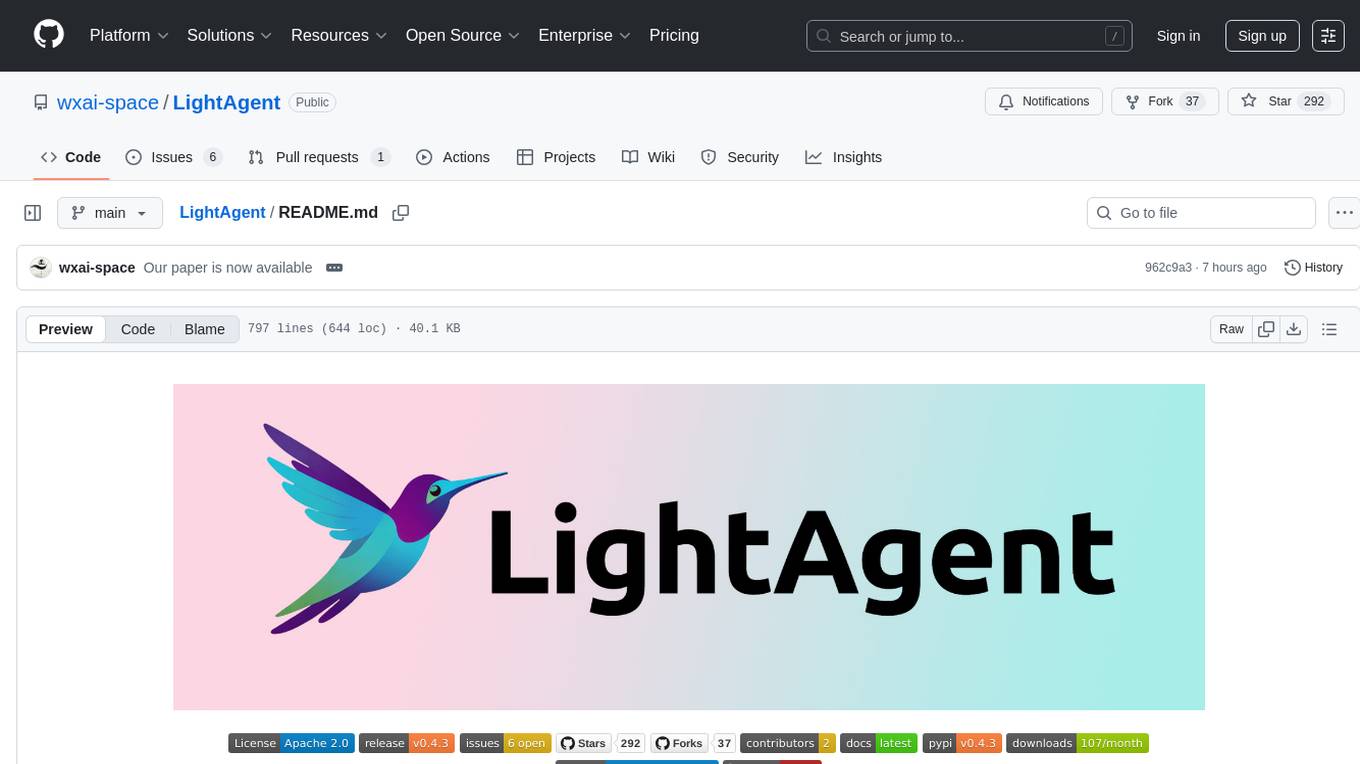
LightAgent
LightAgent is a lightweight, open-source Agentic AI development framework with memory, tools, and a tree of thought. It supports multi-agent collaboration, autonomous learning, tool integration, complex task handling, and multi-model support. It also features a streaming API, tool generator, agent self-learning, adaptive tool mechanism, and more. LightAgent is designed for intelligent customer service, data analysis, automated tools, and educational assistance.

MetaGPT
MetaGPT is a multi-agent framework that enables GPT to work in a software company, collaborating to tackle more complex tasks. It assigns different roles to GPTs to form a collaborative entity for complex tasks. MetaGPT takes a one-line requirement as input and outputs user stories, competitive analysis, requirements, data structures, APIs, documents, etc. Internally, MetaGPT includes product managers, architects, project managers, and engineers. It provides the entire process of a software company along with carefully orchestrated SOPs. MetaGPT's core philosophy is "Code = SOP(Team)", materializing SOP and applying it to teams composed of LLMs.
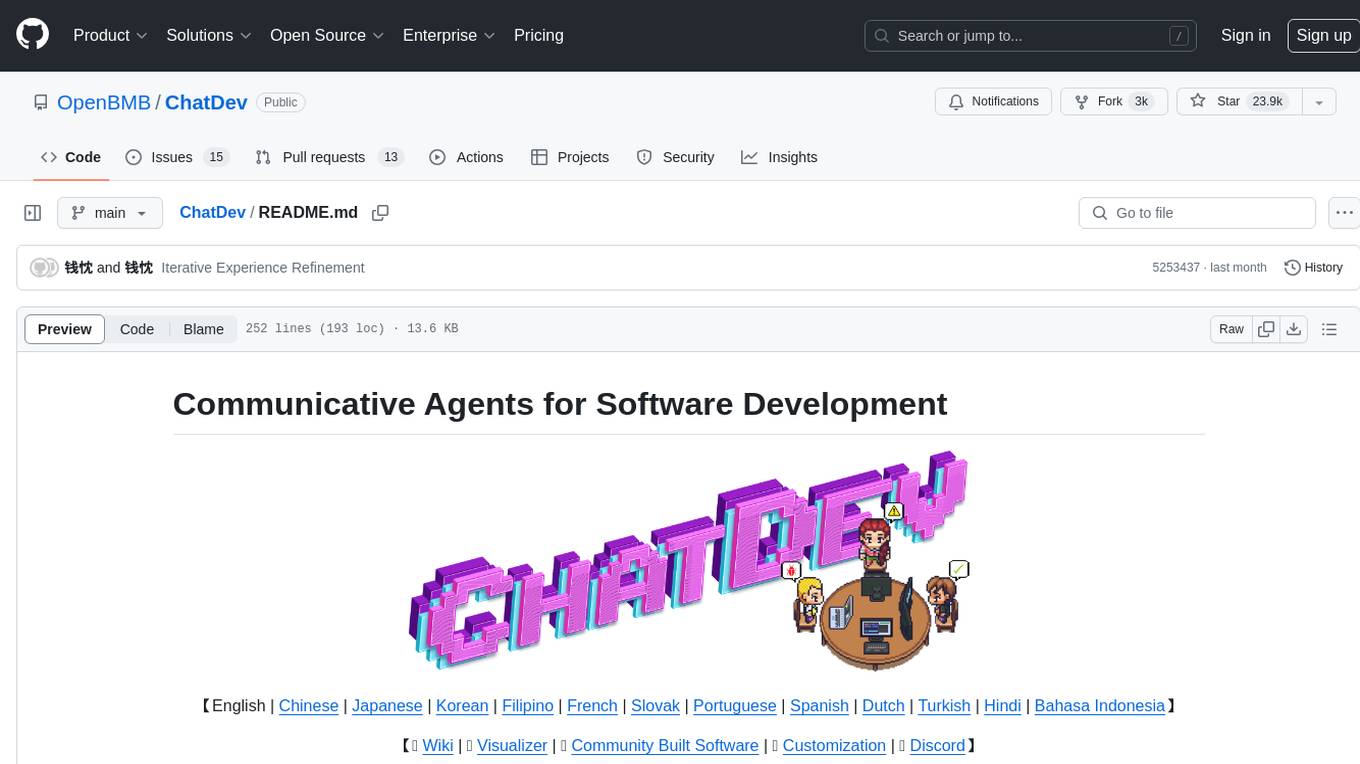
ChatDev
ChatDev is a virtual software company powered by intelligent agents like CEO, CPO, CTO, programmer, reviewer, tester, and art designer. These agents collaborate to revolutionize the digital world through programming. The platform offers an easy-to-use, highly customizable, and extendable framework based on large language models, ideal for studying collective intelligence. ChatDev introduces innovative methods like Iterative Experience Refinement and Experiential Co-Learning to enhance software development efficiency. It supports features like incremental development, Docker integration, Git mode, and Human-Agent-Interaction mode. Users can customize ChatChain, Phase, and Role settings, and share their software creations easily. The project is open-source under the Apache 2.0 License and utilizes data licensed under CC BY-NC 4.0.

Biomni
Biomni is a general-purpose biomedical AI agent designed to autonomously execute a wide range of research tasks across diverse biomedical subfields. By integrating cutting-edge large language model (LLM) reasoning with retrieval-augmented planning and code-based execution, Biomni helps scientists dramatically enhance research productivity and generate testable hypotheses.
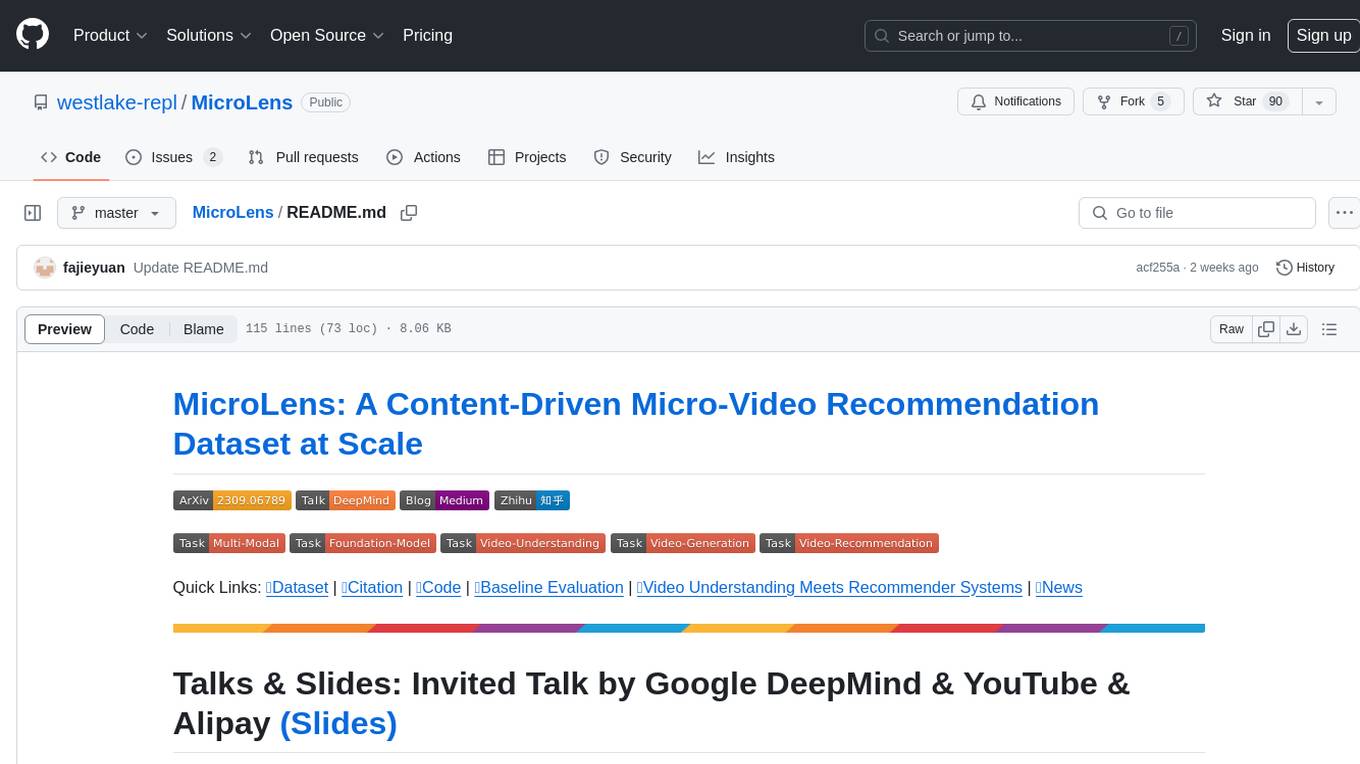
MicroLens
MicroLens is a content-driven micro-video recommendation dataset at scale. It provides a large dataset with multimodal data, including raw text, images, audio, video, and video comments, for tasks such as multi-modal recommendation, foundation model building, and fairness recommendation. The dataset is available in two versions: MicroLens-50K and MicroLens-100K, with extracted features for multimodal recommendation tasks. Researchers can access the dataset through provided links and reach out to the corresponding author for the complete dataset. The repository also includes codes for various algorithms like VideoRec, IDRec, and VIDRec, each implementing different video models and baselines.
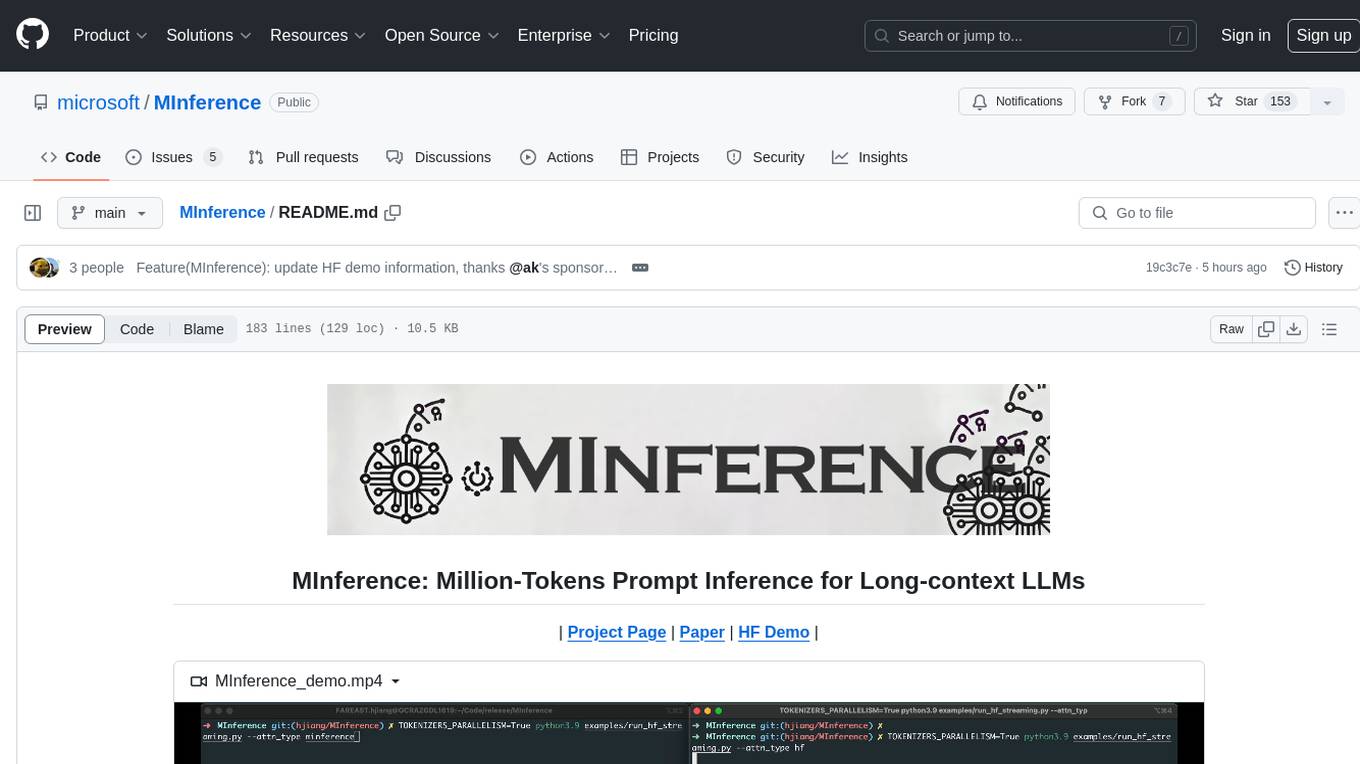
MInference
MInference is a tool designed to accelerate pre-filling for long-context Language Models (LLMs) by leveraging dynamic sparse attention. It achieves up to a 10x speedup for pre-filling on an A100 while maintaining accuracy. The tool supports various decoding LLMs, including LLaMA-style models and Phi models, and provides custom kernels for attention computation. MInference is useful for researchers and developers working with large-scale language models who aim to improve efficiency without compromising accuracy.
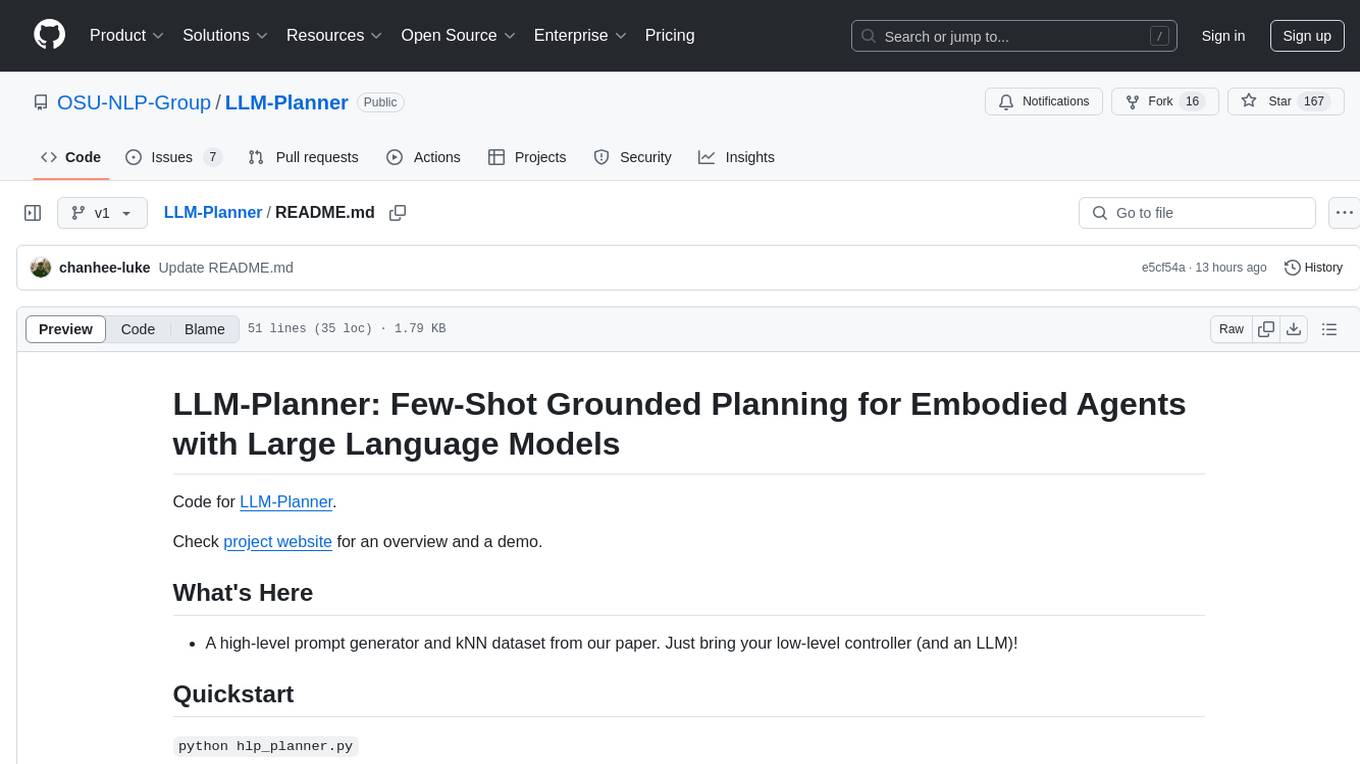
LLM-Planner
LLM-Planner is a tool for few-shot grounded planning for embodied agents using large language models. It includes a high-level prompt generator and kNN dataset, allowing users to generate high-level plans for tasks by bringing their low-level controller and an LLM. The tool has been used in various research projects and provides implementation examples from different conferences. Users can cite the tool using the provided information and the tool is available under the MIT License. For questions or issues, users can contact Luke Song.
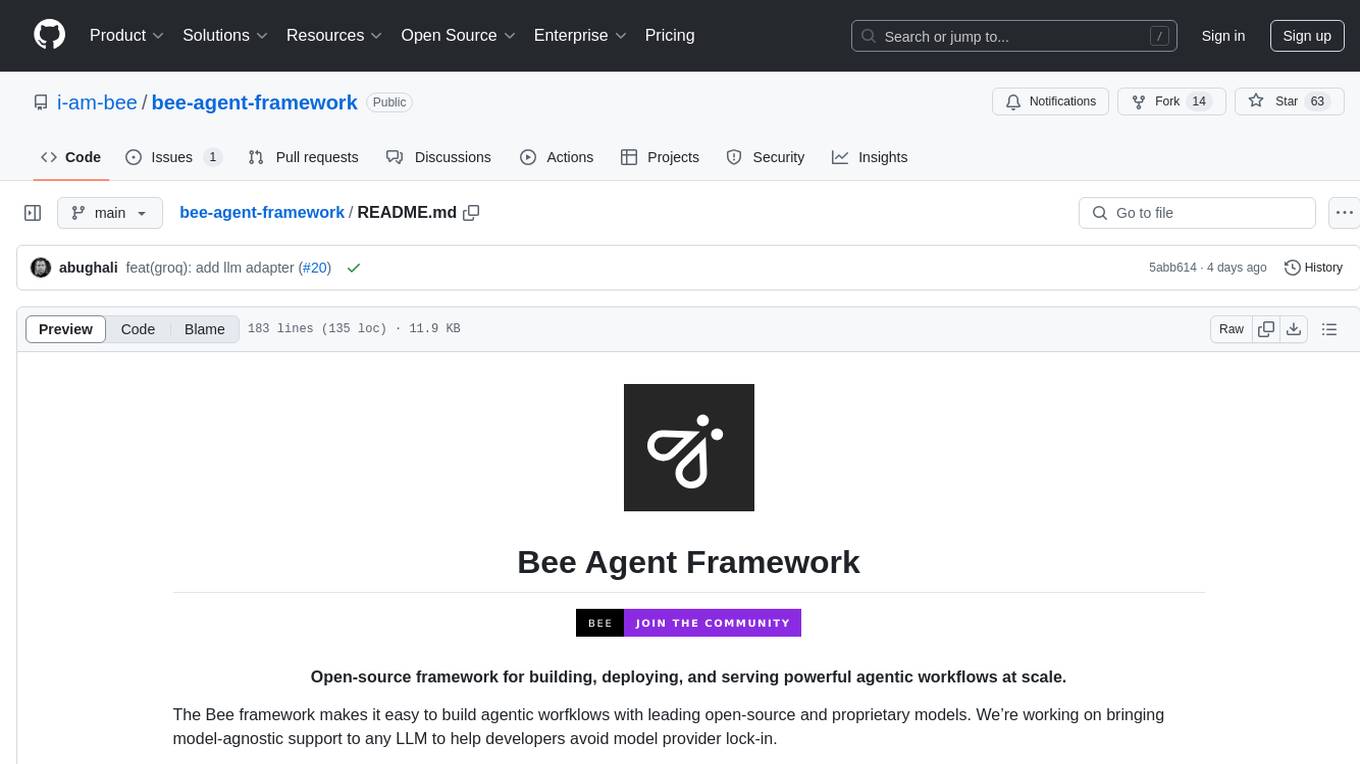
bee-agent-framework
The Bee Agent Framework is an open-source tool for building, deploying, and serving powerful agentic workflows at scale. It provides AI agents, tools for creating workflows in Javascript/Python, a code interpreter, memory optimization strategies, serialization for pausing/resuming workflows, traceability features, production-level control, and upcoming features like model-agnostic support and a chat UI. The framework offers various modules for agents, llms, memory, tools, caching, errors, adapters, logging, serialization, and more, with a roadmap including MLFlow integration, JSON support, structured outputs, chat client, base agent improvements, guardrails, and evaluation.
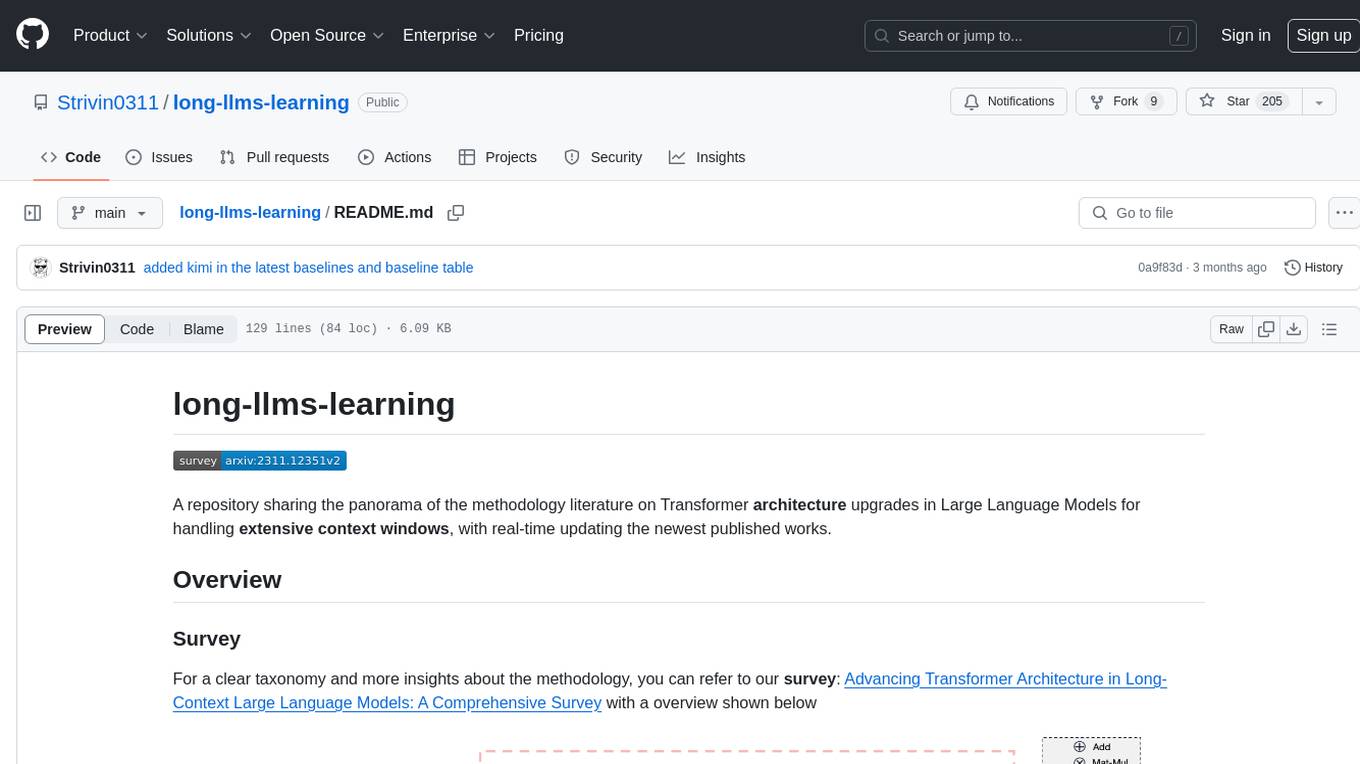
long-llms-learning
A repository sharing the panorama of the methodology literature on Transformer architecture upgrades in Large Language Models for handling extensive context windows, with real-time updating the newest published works. It includes a survey on advancing Transformer architecture in long-context large language models, flash-ReRoPE implementation, latest news on data engineering, lightning attention, Kimi AI assistant, chatglm-6b-128k, gpt-4-turbo-preview, benchmarks like InfiniteBench and LongBench, long-LLMs-evals for evaluating methods for enhancing long-context capabilities, and LLMs-learning for learning technologies and applicated tasks about Large Language Models.
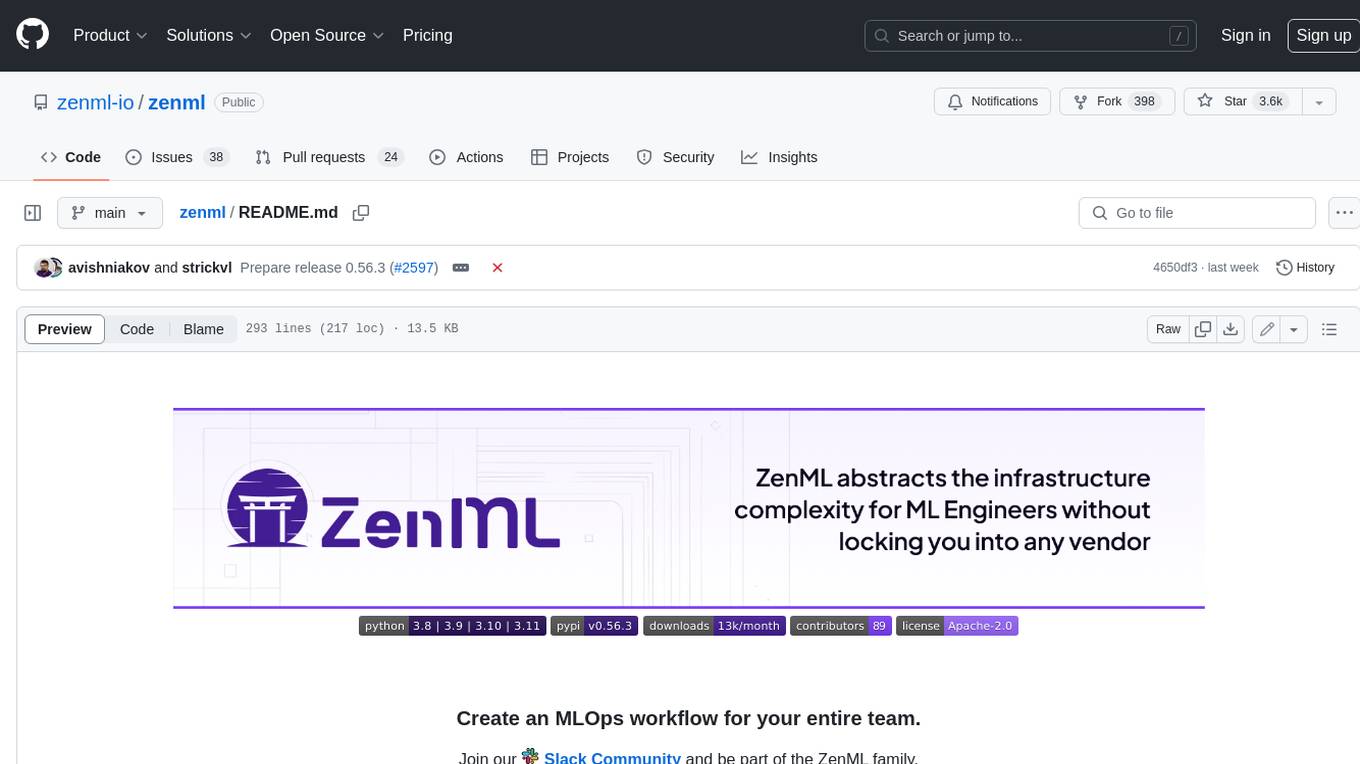
zenml
ZenML is an extensible, open-source MLOps framework for creating portable, production-ready machine learning pipelines. By decoupling infrastructure from code, ZenML enables developers across your organization to collaborate more effectively as they develop to production.

AutoMathText
AutoMathText is an extensive dataset of around 200 GB of mathematical texts autonomously selected by the language model Qwen-72B. It aims to facilitate research in mathematics and artificial intelligence, serve as an educational tool for learning complex mathematical concepts, and provide a foundation for developing AI models specialized in processing mathematical content.

opencompass
OpenCompass is a one-stop platform for large model evaluation, aiming to provide a fair, open, and reproducible benchmark for large model evaluation. Its main features include: * Comprehensive support for models and datasets: Pre-support for 20+ HuggingFace and API models, a model evaluation scheme of 70+ datasets with about 400,000 questions, comprehensively evaluating the capabilities of the models in five dimensions. * Efficient distributed evaluation: One line command to implement task division and distributed evaluation, completing the full evaluation of billion-scale models in just a few hours. * Diversified evaluation paradigms: Support for zero-shot, few-shot, and chain-of-thought evaluations, combined with standard or dialogue-type prompt templates, to easily stimulate the maximum performance of various models. * Modular design with high extensibility: Want to add new models or datasets, customize an advanced task division strategy, or even support a new cluster management system? Everything about OpenCompass can be easily expanded! * Experiment management and reporting mechanism: Use config files to fully record each experiment, and support real-time reporting of results.
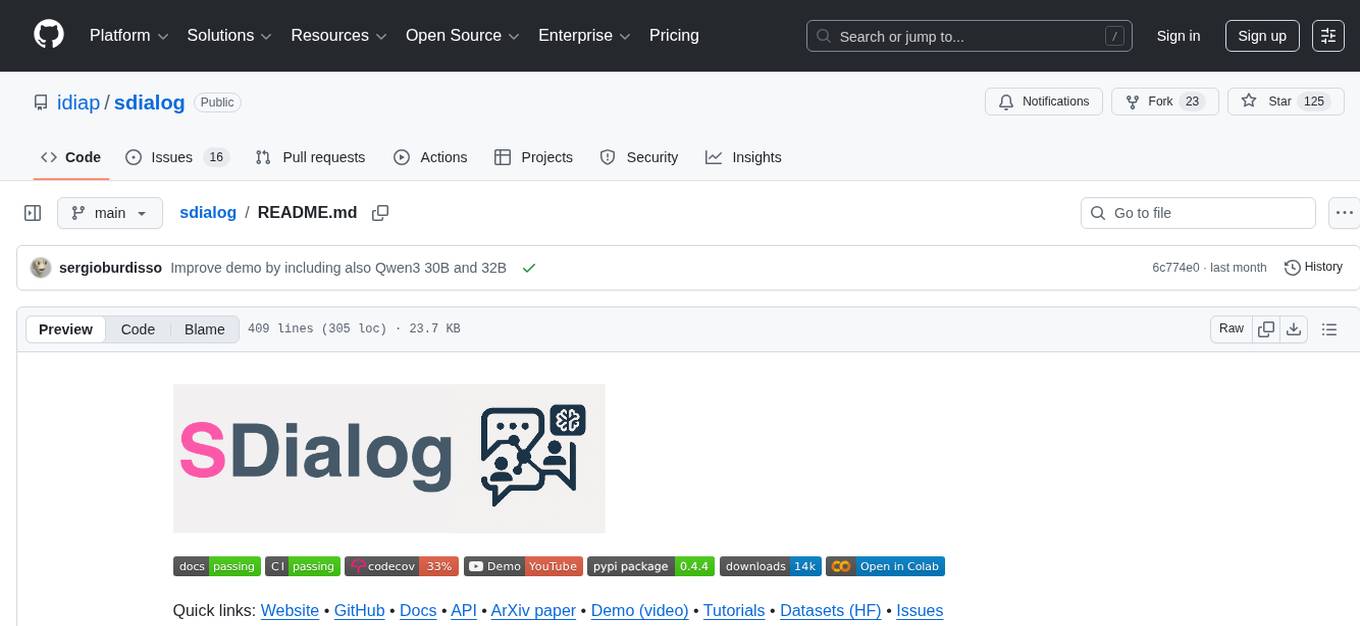
sdialog
SDialog is an MIT-licensed open-source toolkit for building, simulating, and evaluating LLM-based conversational agents end-to-end. It aims to bridge agent construction, user simulation, dialog generation, and evaluation in a single reproducible workflow, enabling the generation of reliable, controllable dialog systems or data at scale. The toolkit standardizes a Dialog schema, offers persona-driven multi-agent simulation with LLMs, provides composable orchestration for precise control over behavior and flow, includes built-in evaluation metrics, and offers mechanistic interpretability. It allows for easy creation of user-defined components and interoperability across various AI platforms.
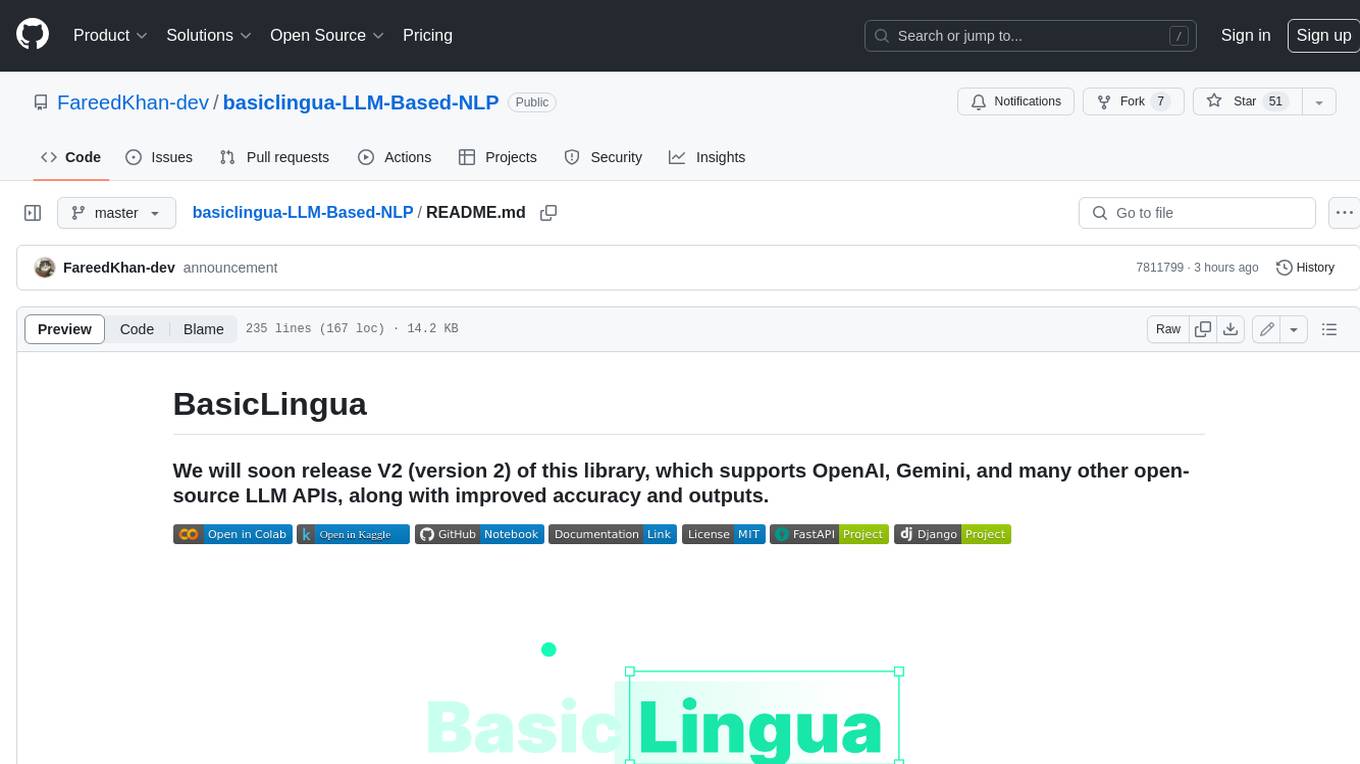
basiclingua-LLM-Based-NLP
BasicLingua is a Python library that provides functionalities for linguistic tasks such as tokenization, stemming, lemmatization, and many others. It is based on the Gemini Language Model, which has demonstrated promising results in dealing with text data. BasicLingua can be used as an API or through a web demo. It is available under the MIT license and can be used in various projects.
For similar tasks

LLM-Brained-GUI-Agents-Survey
The 'LLM-Brained-GUI-Agents-Survey' repository contains code for a searchable paper page and assets used in the survey paper on Large Language Model-Brained GUI Agents. These agents operate within GUI environments, utilizing Large Language Models as their core inference and cognitive engine to generate, plan, and execute actions flexibly and adaptively. The repository also encourages contributions from the community for new papers, resources, or improvements related to LLM-Powered GUI Agents.
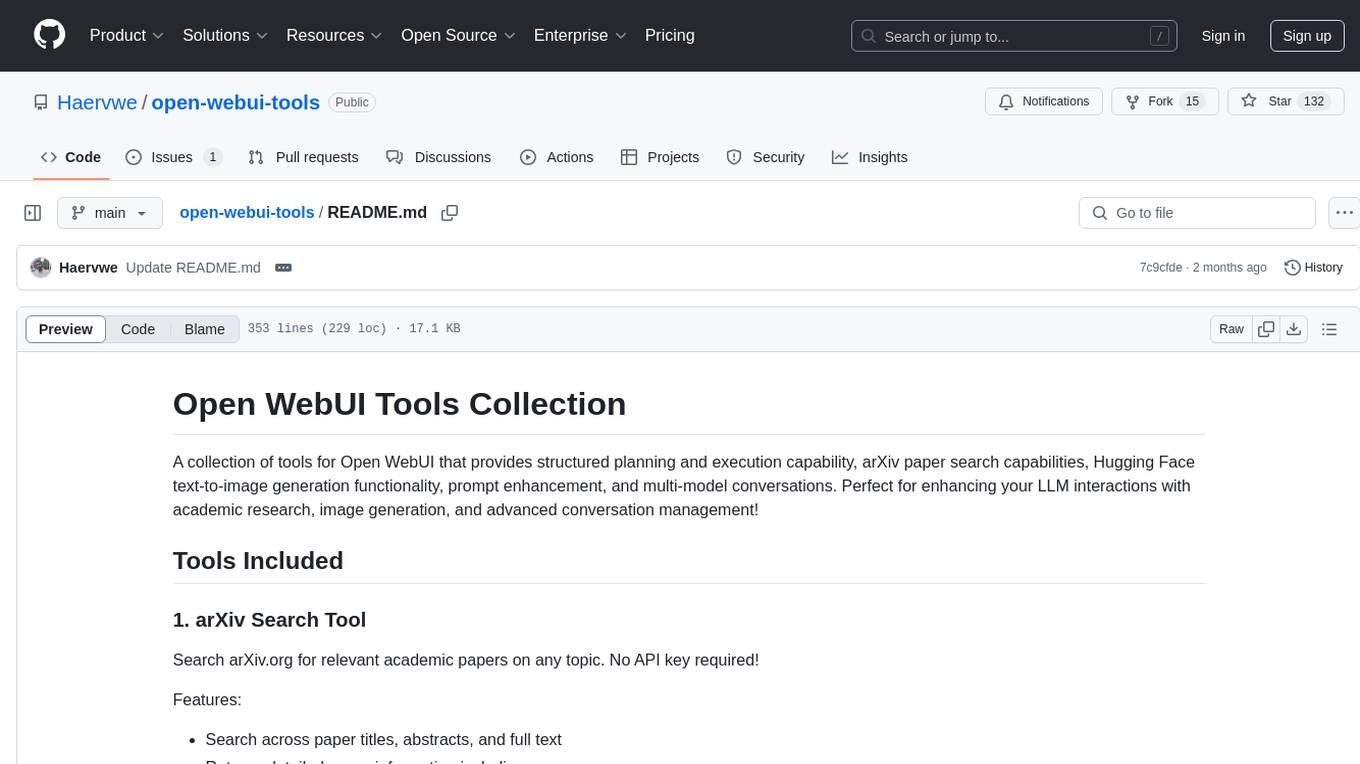
open-webui-tools
Open WebUI Tools Collection is a set of tools for structured planning, arXiv paper search, Hugging Face text-to-image generation, prompt enhancement, and multi-model conversations. It enhances LLM interactions with academic research, image generation, and conversation management. Tools include arXiv Search Tool and Hugging Face Image Generator. Function Pipes like Planner Agent offer autonomous plan generation and execution. Filters like Prompt Enhancer improve prompt quality. Installation and configuration instructions are provided for each tool and pipe.
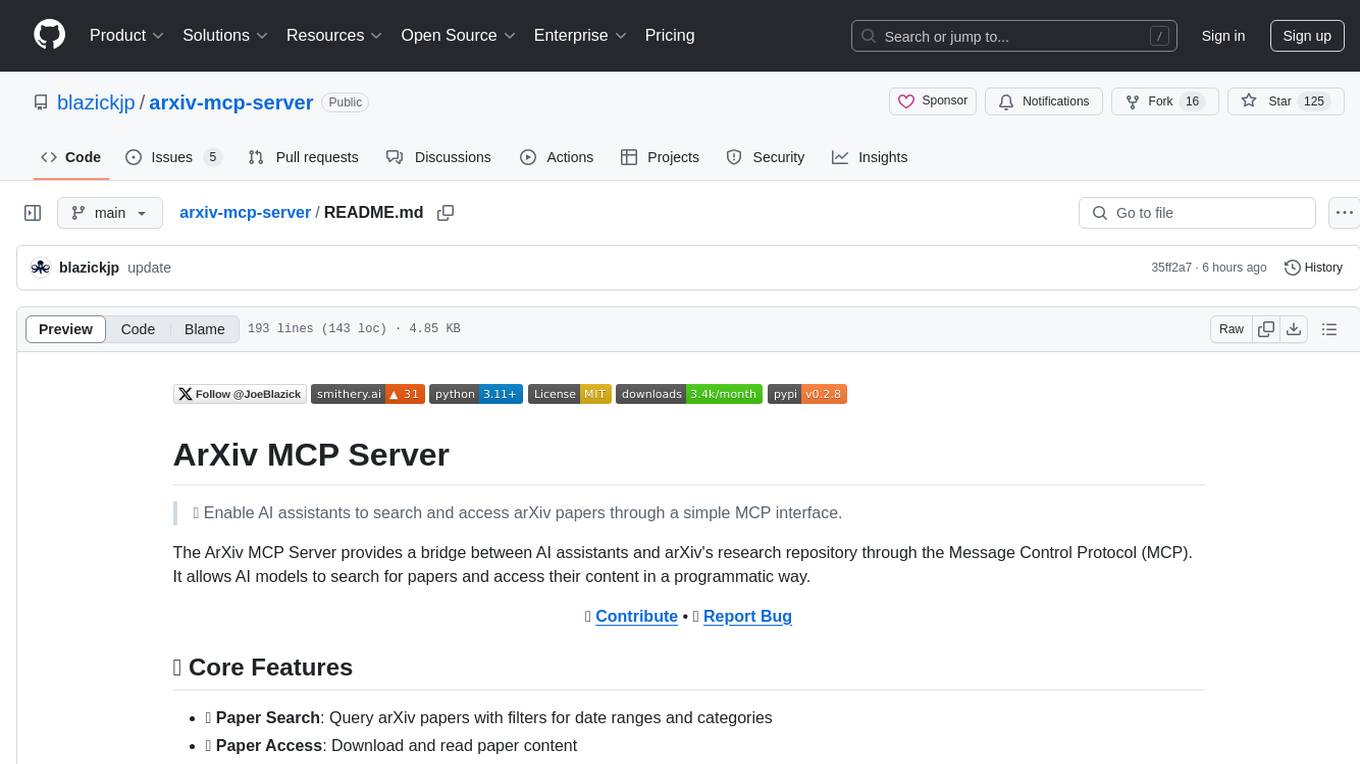
arxiv-mcp-server
The ArXiv MCP Server acts as a bridge between AI assistants and arXiv's research repository, enabling AI models to search for and access papers programmatically through the Message Control Protocol (MCP). It offers features like paper search, access, listing, local storage, and research prompts. Users can install it via Smithery or manually for Claude Desktop. The server provides tools for paper search, download, listing, and reading, along with specialized prompts for paper analysis. Configuration can be done through environment variables, and testing is supported with a test suite. The tool is released under the MIT License and is developed by the Pearl Labs Team.
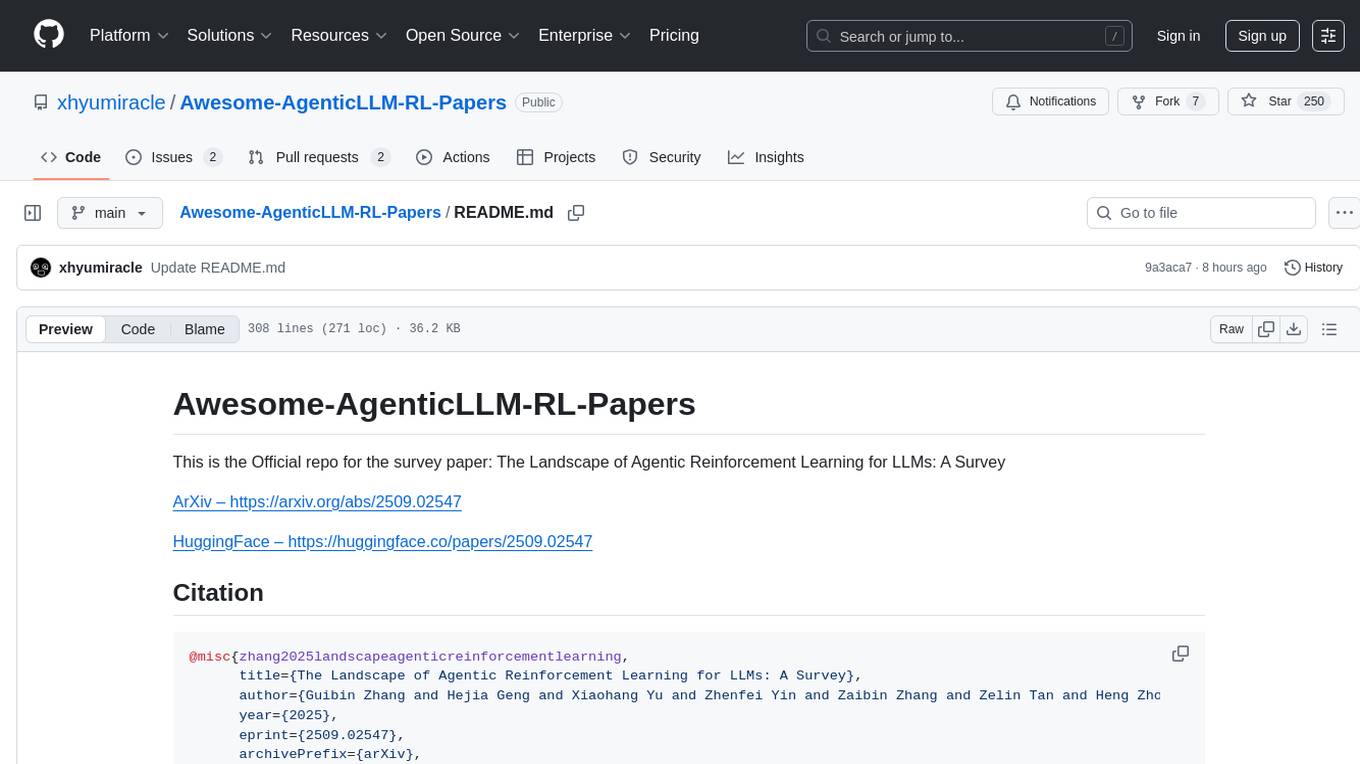
Awesome-AgenticLLM-RL-Papers
This repository serves as the official source for the survey paper 'The Landscape of Agentic Reinforcement Learning for LLMs: A Survey'. It provides an extensive overview of various algorithms, methods, and frameworks related to Agentic RL, including detailed information on different families of algorithms, their key mechanisms, objectives, and links to relevant papers and resources. The repository covers a wide range of tasks such as Search & Research Agent, Code Agent, Mathematical Agent, GUI Agent, RL in Vision Agents, RL in Embodied Agents, and RL in Multi-Agent Systems. Additionally, it includes information on environments, frameworks, and methods suitable for different tasks related to Agentic RL and LLMs.
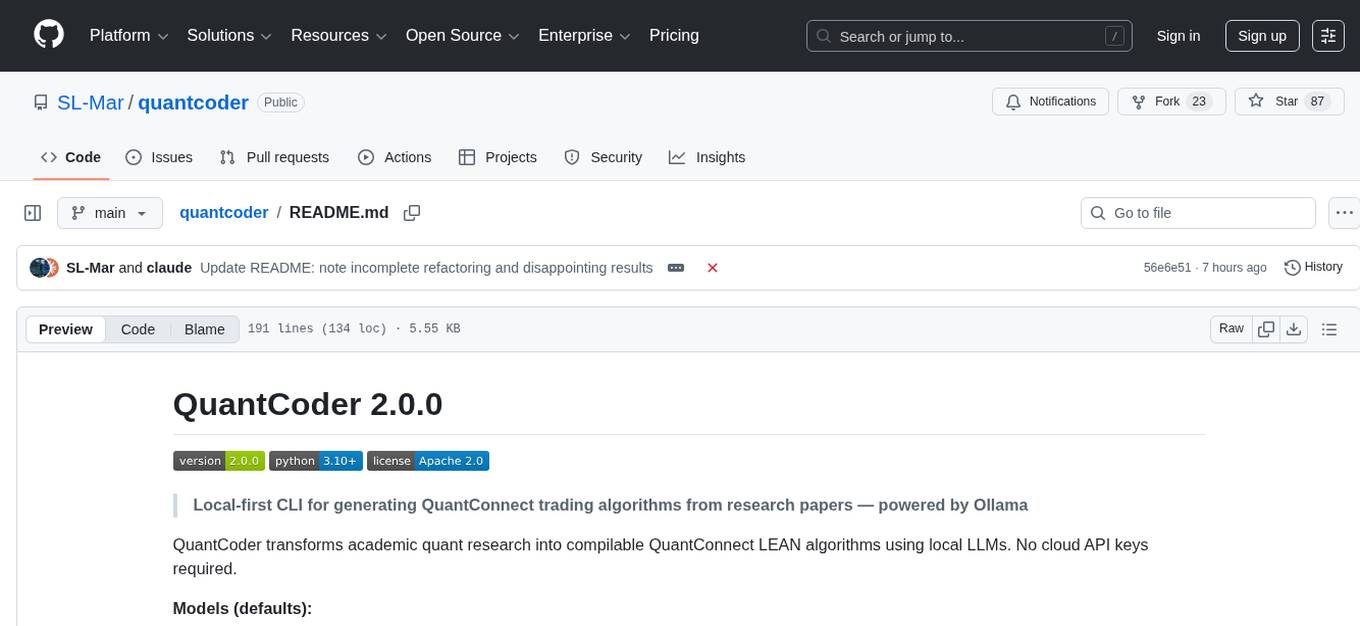
quantcoder
QuantCoder is a local-first CLI tool that generates QuantConnect trading algorithms from academic research papers. It uses local LLMs for code generation, refinement, and error fixing. The tool does not require cloud API keys and offers models for reasoning, summarization, and chat. Users can interact with QuantCoder through interactive, CLI, programmatic, and autonomous modes. It also features an evolution mode inspired by AlphaEvolve, backtesting with detailed metrics, library building, and integration with QuantConnect for backtesting and deployment. The tool's architecture includes components for CLI, configuration management, NLP, multi-agent system, evolution engine, self-improving pipeline, library builder, and integration with QuantConnect MCP.
For similar jobs

weave
Weave is a toolkit for developing Generative AI applications, built by Weights & Biases. With Weave, you can log and debug language model inputs, outputs, and traces; build rigorous, apples-to-apples evaluations for language model use cases; and organize all the information generated across the LLM workflow, from experimentation to evaluations to production. Weave aims to bring rigor, best-practices, and composability to the inherently experimental process of developing Generative AI software, without introducing cognitive overhead.

LLMStack
LLMStack is a no-code platform for building generative AI agents, workflows, and chatbots. It allows users to connect their own data, internal tools, and GPT-powered models without any coding experience. LLMStack can be deployed to the cloud or on-premise and can be accessed via HTTP API or triggered from Slack or Discord.

VisionCraft
The VisionCraft API is a free API for using over 100 different AI models. From images to sound.

kaito
Kaito is an operator that automates the AI/ML inference model deployment in a Kubernetes cluster. It manages large model files using container images, avoids tuning deployment parameters to fit GPU hardware by providing preset configurations, auto-provisions GPU nodes based on model requirements, and hosts large model images in the public Microsoft Container Registry (MCR) if the license allows. Using Kaito, the workflow of onboarding large AI inference models in Kubernetes is largely simplified.

PyRIT
PyRIT is an open access automation framework designed to empower security professionals and ML engineers to red team foundation models and their applications. It automates AI Red Teaming tasks to allow operators to focus on more complicated and time-consuming tasks and can also identify security harms such as misuse (e.g., malware generation, jailbreaking), and privacy harms (e.g., identity theft). The goal is to allow researchers to have a baseline of how well their model and entire inference pipeline is doing against different harm categories and to be able to compare that baseline to future iterations of their model. This allows them to have empirical data on how well their model is doing today, and detect any degradation of performance based on future improvements.

tabby
Tabby is a self-hosted AI coding assistant, offering an open-source and on-premises alternative to GitHub Copilot. It boasts several key features: * Self-contained, with no need for a DBMS or cloud service. * OpenAPI interface, easy to integrate with existing infrastructure (e.g Cloud IDE). * Supports consumer-grade GPUs.

spear
SPEAR (Simulator for Photorealistic Embodied AI Research) is a powerful tool for training embodied agents. It features 300 unique virtual indoor environments with 2,566 unique rooms and 17,234 unique objects that can be manipulated individually. Each environment is designed by a professional artist and features detailed geometry, photorealistic materials, and a unique floor plan and object layout. SPEAR is implemented as Unreal Engine assets and provides an OpenAI Gym interface for interacting with the environments via Python.

Magick
Magick is a groundbreaking visual AIDE (Artificial Intelligence Development Environment) for no-code data pipelines and multimodal agents. Magick can connect to other services and comes with nodes and templates well-suited for intelligent agents, chatbots, complex reasoning systems and realistic characters.





